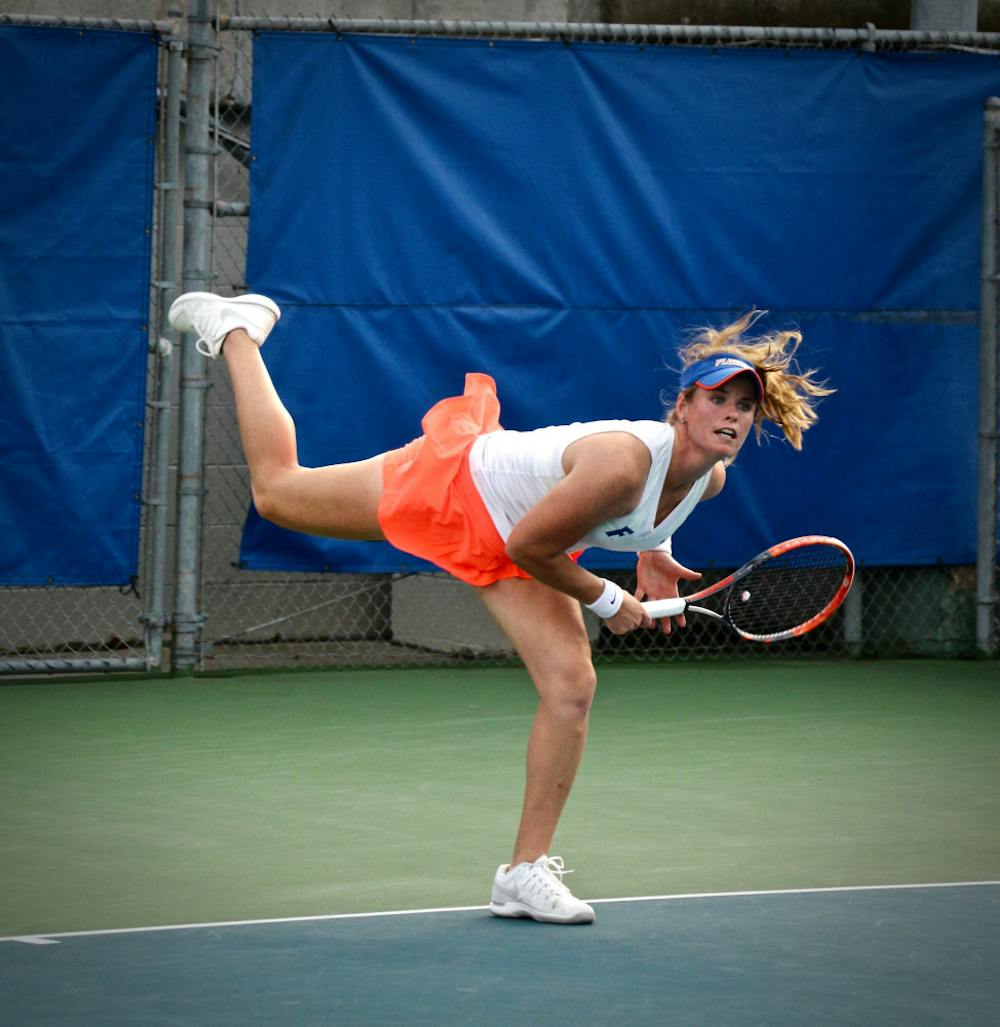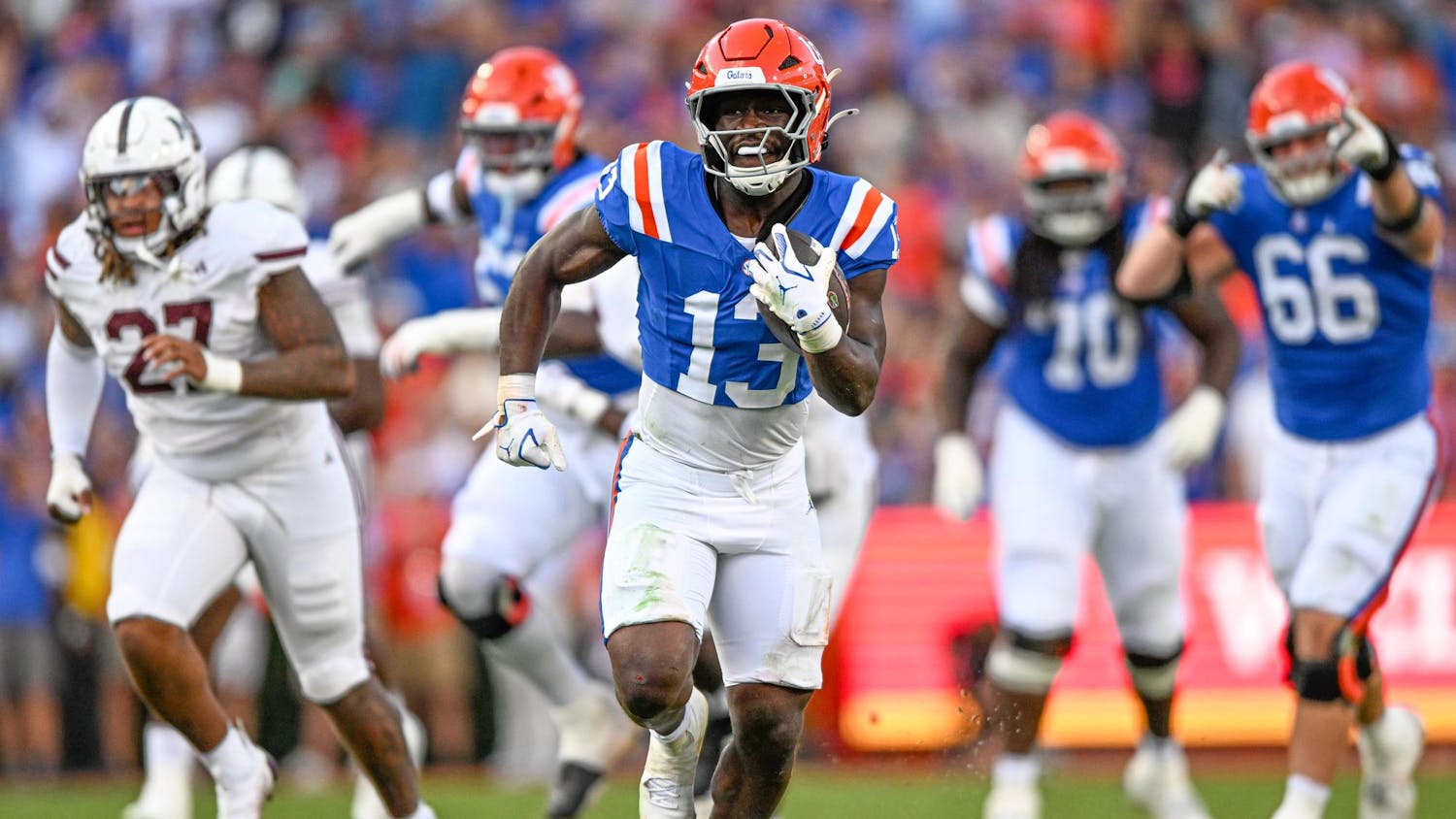It was a once-in-a-lifetime moment Belinda Woolcock never saw coming.
Standing on the courts of the Dan Magill Tennis Complex in Athens, Georgia, on May 23, 2017, Belinda had just won the final singles match of her dual-match career as a college tennis player, notching a 6-1, 6-3, victory over Stanford’s Caroline Doyle.
Belinda waited on the sidelines of the dimly lit playing area, keeping her eyes trained on teammate Ingrid Neel as she got closer and closer to finishing off her opponent.
When a forehand from the Cardinal’s Taylor Davidson went out of play to clinch the win for Neel, Belinda sprinted toward her teammate, her arms opened wide in celebration as Gators fans screamed and cheered from the stands.
The first few seconds after the Florida women’s tennis team won the 2017 NCAA championship — the seventh national title in program history — is a memory Belinda will never forget.
Belinda’s experience with the collegiate sports world in the United States wasn’t necessarily a life-long goal of hers, but a pro tennis career certainly was in the forefront of her mind.
This was one of the reasons why she decided to travel 9,685 miles away from her native country of Australia. But the decision certainly came with its difficulties.
* * *
Belinda developed a strong background in tennis during her childhood years in Melbourne — a city in Victoria, Australia.
She was introduced to the sport when she was 5 and began competing in tournaments when she was 7.
Eleven years later, after becoming one of the top amateur tennis players in Melbourne, she had a decision to make: Did she want to pursue college tennis or enter the professional circuit?
There were pros and cons to both choices.
Belinda’s primary focus as a young talent was improving her world ranking to gain opportunities as a professional.
While college tennis would help her hone her skills, she wouldn’t receive the level of global recognition competing in the NCAA that she would if she went pro immediately.
Australia’s attitude toward college athletics was also a deterrent.
According to Belinda, the country looks down upon playing sports at the university level.
“If you really cared about tennis, you played professional,” she said.
However, Belinda found herself in a rut with Tennis Australia, the governing body for tennis in her home country.
She noticed minimal improvement in her game, which she largely blamed on her training environment. There weren’t many women her age competing at the same level she was, limiting her practices to one-on-one sessions with a private coach.
Belinda’s father, Geoff, noticed her lack of development under Tennis Australia as well, attributing it to her isolation from competing at a high level with others.
“Belinda thrives in a team environment,” he said. “The whole idea of competing for somebody, whether it’s a college or your country, really gets her going.”
In April 2013, Belinda realized the United States was the best option for her. She began reaching out to schools including Florida, Duke, Texas and Tennessee and told her parents she wanted to play college tennis abroad.
While Geoff was elated, her mother, Jane, did not share his same level of excitement.
Jane feared that college wouldn’t be a good fit for Belinda and was concerned she wouldn’t get to witness her daughter improve.
Belinda assured her that she could still play professionally after leaving school, but Jane’s insecurities weren’t eased immediately. It took a lot of research for her to fully support the idea of a collegiate experience for her daughter.
Belinda showed her mother research she’d done on the schools she was interested in, organizing lists of information in spreadsheets and sending her mother videos of tennis players who’d competed at the university level before playing professionally.
After watching the videos and examining Belinda’s research, Jane’s perspective changed. She gave her daughter full support and the green light to start visiting schools. Soon after, Belinda committed to Florida.
The night before she left for the U.S., her nerves started kicking in.
Her mind lingered on the fact she didn’t know anyone in Gainesville and wasn’t sure what to do when she arrived.
Belinda was flying to the other side of the world all by herself and not coming home.
The anxiety quickly got the best of her.
While Belinda was in the process of packing her things, her sister, Sarah, walked into her room and found her crying.
Belinda wanted to be welcomed and liked, but the fact she was moving to a foreign country created a lot of unknowns.
Sarah helped Belinda calm down by giving her some final reassurances. The next day, Belinda was off to the U.S.
* * *
During her first semester in Gainesville, Belinda thrived in a team environment. The constant companionship and competitive setting instilled passion back into her tennis game.
However, the homesickness she felt in her first six months of college overshadowed the excitement surrounding her new classes and teammates.
Belinda felt an uneasiness that could only be calmed by talking to her family.
Geoff said frequent FaceTime calls became the go-to solution to keeping Belinda grounded. They kept her reassured that she’d made the right decision any time she was down on herself or questioned if she’d made a mistake.
The first time Belinda came home during her freshman year, Jane realized her daughter had made a good choice.
Belinda was playing with more confidence, at a more upbeat tempo and seemed happier overall.
Before she moved to Gainesville, she would allow her emotions to boil over if she wasn’t playing well.
But after enrolling at UF, she matured under the guidance of coach Roland Thornqvist, becoming more accepting and composed when she lost.
Halfway through her collegiate career, however, Belinda hit a breaking point.
She returned home to Australia during the summer between her sophomore and junior seasons questioning if the United States was still the right option for her.
Belinda was frustrated that her pro career rankings had come to a halt while she competed at the collegiate level.
In the NCAA, tennis teams use the fall semester to compete in exhibition tournaments to prepare for the spring season, limiting players opportunities to participate in professional events.
It became a gut-wrenching situation for Belinda.
If she competed in college tournaments, her personal ranking in the pro circuit would suffer, but if she competed in pro tournaments, Belinda risked losing her spot in Florida’s lineup.
After spending the summer back home training, Belinda realized not much had changed in Australia.
The only thing keeping her there was her family, as a lack of organization and structure in Tennis Australia had put the program in disarray.
Belinda realized she couldn’t think of a reason to leave UF.
It was important to her that she completed her degree. If she put a halt on her education to play pro tennis, it would be difficult to go back to the U.S. later to finish her education.
When Belinda came back to Florida for her junior season, she set her eyes on finishing her collegiate career strong, specifically claiming a national championship with her teammates.
Two years later, the Gators clinched their seventh NCAA title in program history with their 4-1 defeat over Stanford in Athens.
She was also named the Most Outstanding Player of the 2017 NCAA Tennis Championships.
“It just made us really, really proud,” Geoff said. “I knew that she was enjoying it and it was great to see it.”
* * *
After completing her collegiate career in May, Belinda was forced to start from scratch to build up her pro circuit ranking.
She started off by competing in lower-level tournaments with prize money usually ranging between $15,000 to $25,000.
Within six months of graduating, she has already gone from unranked to No. 582 in singles and and No. 476 in doubles. She’s also learned that patience has been key in this whole process.
Belinda is 12-10 in singles play and 20-8 in doubles play so far this year at the ATP/WTA and ITF Pro Circuit level. In August, she won a doubles title in Romania with her partner Samantha Harris, another Australian native.
Belinda said her success at Florida, amongst other Australian athletes that have gone to the U.S., helped cause an attitude shift in her home country about playing at the collegiate level.
She said that Tennis Australia is now putting in efforts to build more of a team environment in every city that has an academy.
“They’re trying to mirror the college experience,” Belinda said. “They’re trying to… get that feeling of enjoyment as a team rather than just individual.”
Follow Mari Faiello on Twitter @faiello_mari and contact her at mfaiello@alligator.org.
Former Florida tennis player Belinda Woolcock went from an apprehensive 18-year-old nervous about leaving home to an NCAA champion full of confidence.






